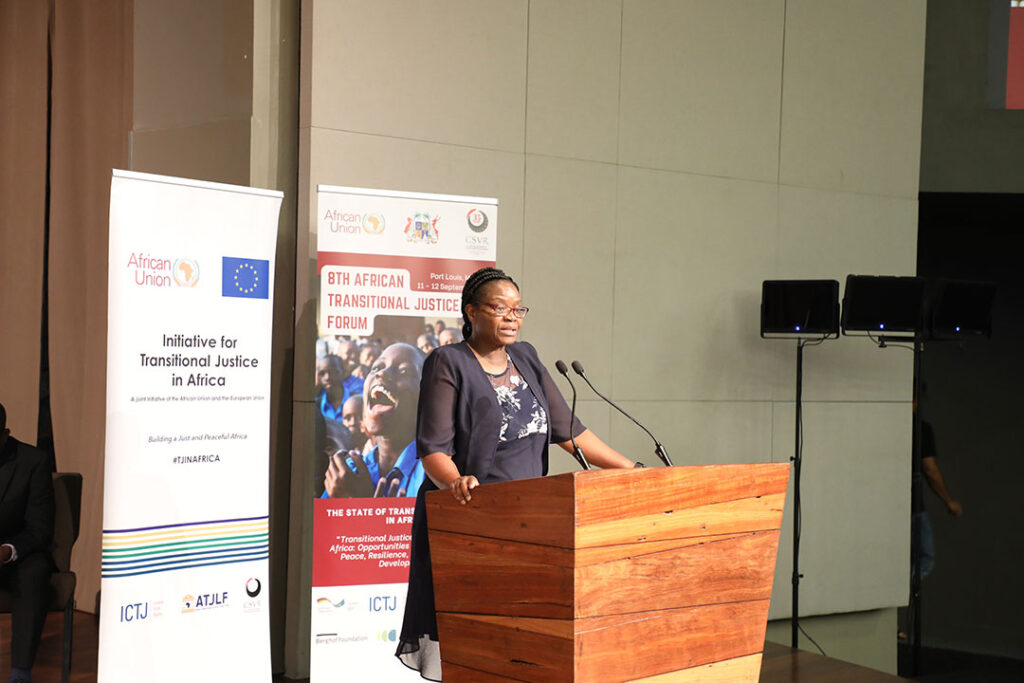ADF STAFF
Neighboring countries Somalia and Ethiopia are trying to put an end to violence that has affected the Horn of Africa for decades. Some experts believe the healing must begin at the community level and spread from person to person.
There are grassroots efforts to institutionalize transitional justice and reconciliation (TJ&R) in the region to end the cycle of tragedy by acknowledging past wrongs and addressing deeply rooted grievances.
“Transitional justice can help to transform a society by addressing historical injustices, fostering inclusivity and promoting a culture of human rights,” Patience Chiradza, African Union director for Governance and Conflict Prevention, said during the opening ceremony of the 8th edition of the African Transitional Justice Forum on September 11 in Port Louis, Mauritius.
With 30 years of transitional justice efforts on the continent yielding a mix of successes and failures, the AU and international peacemaking experts are looking to local civil society organizations (CSOs) to make a difference in the Horn. Both countries still bear the marks of years of civil war. In Somalia, divisions and rivalries between clans persist and terrorism continues to intensify, while Ethiopia contends with recurring ethnic tensions and violence.
“Somalia and Ethiopia have both initiated processes to address historical grievances, promote accountability and enhance peace,” peacebuilding experts Saron Hirpa Abu and Eden Matiyas Mulugeta recently wrote in blog post for the Wilson Center research institute. “[Their processes] focus on inclusive dialogue, public consultation and engaging diverse stakeholders such as CSOs, traditional leaders, women and youth. Both frameworks seek to rebuild trust, enhance governance and establish a foundation for sustainable peace.”
With its aim to prevent violence, TJ&R can help these war-torn societies move from conflict to peace and stability through more-inclusive governance. Without TJ&R processes, unresolved grievances and mistrust can fuel ongoing conflict, according to the AU’s Transitional Justice Policy.
National efforts in Ethiopia and Somalia have faced criticism. In the wake of the November 2022 peace deal that stopped Ethiopia’s devastating civil war in the Tigray region, federal officials promised to establish a national transitional justice policy. Ethiopian victims of documented war crimes and ethnic cleansing continue to wait for policy debate to turn into actual dialogue.
One “glaring issue undermining the transitional justice process is the heavy-handed involvement of the state, accused of perpetrating atrocities, not only in formulating the policy but also in its imminent implementation,” the Addis Standard newspaper wrote in a May 17 editorial. “This pervasive state involvement renders the process ineffective and fosters distrust among the public and other stakeholders.”
Somalia launched its National Reconciliation Framework (NRF) in 2017, but it was delayed and relaunched this year.
Local groups in both countries are looking to regain momentum where national efforts have stalled or lost the confidence of the people. There are renewed hopes in Somalia’s process, which was borne out of nationwide consultations, including CSOs.
“The NRF aims to tackle historical grievances and structural injustices by promoting national reconciliation, restoring trust, and rebuilding confidence in government,” Abu and Mulugeta wrote. “It integrates traditional and modern conflict resolution methods to foster peace and counter-extremism.”
In their blog post, the two urged further involvement from CSOs and other local groups that already have established trust within their communities and serve historically marginalized groups.
“Both countries can leverage CSO networks to extend their reach within communities,” they wrote. “CSOs are well-positioned to lead community dialogues, civic education, truth-telling and reconciliation initiatives. To enhance these efforts, governments need to establish genuine and open platforms that actively support CSO-led initiatives advancing these important government policies by including grassroots voices.”

